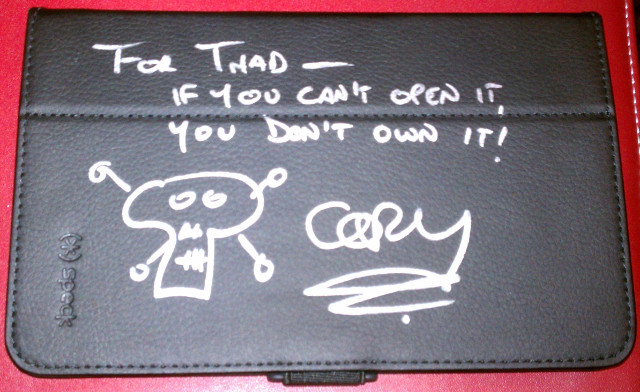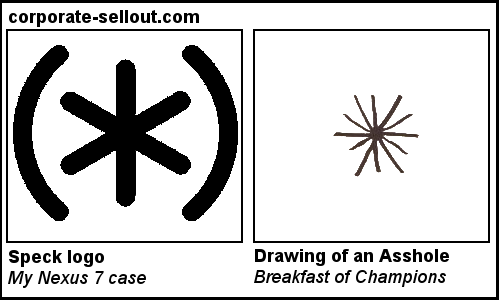My Penders coverage continues. See previous installments under the Ken Penders tag.
So what's actually at stake in Archie v Penders?
What does Ken want?
Penders wants a court to rule, decisively, that he never entered into any contractual agreement with Archie Comics beyond first print rights, and to grant him sole ownership of every story that he both wrote and drew, and co-ownership of every story where he did one or the other but not both.
This includes various Sonic stories from issue #11 all the way up to #140, some specials, and the entire Knuckles series, and any original characters and locations introduced therein.
Contrary to how the enraged fanboys would have it, this does not mean that Archie would not be allowed to reprint those stories or reuse those characters -- it just means that Archie would have to compensate him for that use.
First of all, in many cases, Ken wouldn't have full ownership over those stories, characters, and locations -- as mentioned, he would only gain full ownership over stories that he wrote and drew; he would only gain co-ownership of stories where he worked with other writers or artists. (Usually half-ownership, because a comic typically has two creators, writer and artist -- but some of the stories had multiple writers and/or artists.) Sega would retain the remaining share of the rights -- at least, until and unless Ken's partner(s) on a story came forward making similar legal claims and asserting their co-ownership -- and retain the right to do whatever it wanted with them, so long as it compensated Ken for his portion of ownership.
And secondly, it wouldn't be in Ken's interest to halt the reprinting of any of those stories or the reuse of any of those characters. He wants Archie and Sega to continue using them -- so that he gets paid for their use.
Ken also wants to continue the stories he began in Knuckles the Echidna. He wants to be able to use the original characters he created and continue to build that world, through a publisher of his choosing, without oversight or approval from Archie or Sega.
The rub is, even if Ken gets all the copyrights he's seeking, he won't get the trademarks. Even if he can use Rob o' the Hedge, he's going to have to make him look a lot less like Sonic the Hedgehog. Likewise, his echidna characters are going to have to look significantly different from Knuckles.
Also for trademark reasons, while Ken will have the reprint rights to everything he wrote or drew for Archie, in the vast majority of those cases he won't actually be able to exercise those rights without permission from Sega. He'll be allowed to reprint any story that doesn't have any of Sega's characters or anyone who looks like Sega's characters in it, but nothing with Sonic, Tails, Knuckles, Sally, et al, and if he wants to reprint stories with Locke, Rob o' the Hedge, or other trademark-derivative characters, he's going to have to redraw them first.
A decisive victory for Penders would include damages and back pay for all the years Archie has continued to exploit his copyrights, and would lead to a ruling in his suit against Sega and EA that those companies had likewise violated his copyrights and owed him back pay and damages for Sonic Chronicles: The Dark Brotherhood.
What does Archie want?
Archie wants a decisive declaration that Ken signed a work-for-hire agreement and that all his work was produced under for-hire conditions, that he agreed to a flat page rate, and that it was paid. Archie wants the court to rule that it doesn't owe Ken anything more than what it's already paid him, and is free to continue reprinting his back issues and using his characters without any additional compensation.
Short of that, Archie wants to minimize any potential payout it may have to make. It's already gone to some efforts to remove the disputed characters from the covers of reprints and to write them out of its universe. If Archie has to pay Ken, it will want to pay as little as possible, and have as little obligation to him going forward as it can get away with.
How big could this be?
The smallest impact this litigation could possibly have is, well, the impact it's already had: Ken's characters get benched awhile until this gets sorted out, and Archie eventually brings them back. A ruling that's favorable to Archie would pretty much ensure this happens.
Even in the case of a ruling favorable to Penders, Archie could still bring the characters back and continue to issue reprints of Penders-era stories; all it would have to do is compensate him for their use. I have to stress, here, that Penders is not seeking to halt Archie and Sega from profiting from his work -- he just wants a cut. If Archie does permanently drop Penders's characters and cease reprinting his comics, make no mistake: that's out of spite, not legal obligation. That's not Archie being forced to stop using those works, it's Archie choosing not to use them so it doesn't have to pay Penders for them.
As for the biggest potential impact? Well, it involves the character Robo-Robotnik.
Robo-Robotnik is a character who first appeared in Sonic the Hedgehog #19, by Penders, Mike Kanterovich, Dave Manak, and Art Mawhinney. He's a parallel-universe version of Robotnik.
Now, the "original" Robotnik -- the one who resembles the version from the Saturday morning cartoon -- dies in issue #50.
In #75, a new Robotnik steps in; as you'd expect, he more closely resembles the Robotnik from the games (and as the games gave up the "Robotnik" name for the original Japanese "Eggman", the comics followed suit).
But here's the rub: the new Robotnik in #75 is Robo-Robotnik, hopping from his parallel universe to Mobius Prime and creating a new body for himself.
So the ramifications of this are potentially huge: technically speaking, the Eggman who has been the main antagonist in the Sonic the Hedgehog comic from issue #75 to present was co-created by Ken Penders. Best case for Ken and worst for Archie, a court agrees that Ken co-owns the rights to this version of Eggman.
Now, Archie could still kill him off and have yet another parallel universe Eggman take his place; that'd be trivial enough and would keep them from having to compensate Penders for Eggman's future appearances.
But that would still leave the entire run of the Sonic comic from #75 to today -- approaching issue #250 -- featuring a Penders-derived character in a primary role.
Now, Archie is big on reprints. Huge on reprints. And they can choose not to reprint any stories containing, say, Julie-Su the Echidna -- but they can't refuse to reprint any issue containing Robo-Robotnik; that would gut their back catalog. They would have to play ball and offer Penders compensation for reprints.
What would a settlement entail?
Of course, the thing about out-of-court settlements is that they're typically not disclosed to the public. If Penders and Archie do settle, we'll never know most of the details.
But what we do know, because it's been mentioned in the public record, is that both sides are seeking an agreement where Penders is allowed to publish his own comics featuring his original characters, provided he alters their appearances to avoid infringing on Sega's trademarks.
Other than that, all I can offer is conjecture.
At a guess, Penders will allow Archie to continue to use his characters, and probably allow Sega co-ownership rights. (This will be useful to Sega and Archie in case their other co-creators come forward seeking the copyrights.) Archie will want to offer him a one-time payment for these rights; Penders will be seeking co-ownership and a guarantee of royalties or at least some form of profit-sharing agreement. It's unclear which of those will happen.
Given the leverage Penders has with Robo-Robotnik, I think Archie will push for him to sign away the rights to that character in particular, guarantee that he will never try to claim an ownership stake in him, and that he is indeed the same character as Sega's Dr. Eggman and not an original character at all. I think Penders is likely to agree to this -- while co-ownership of Robo-Robotnik could be one of the strongest victories he could make, it's also going to be one of the trickier ones in court. My guess is Penders will give up his claim to Robo-Robotnik in exchange for something else he wants -- either a reasonably-sized one-time payout, or a stronger position with the rights to the other characters who he can actually use in his own comics. (Robo-Robotnik is, of course, a complete non-starter for use in Ken's own comics; he's so fundamentally tied to the character of Eggman that Ken would have to change him so substantially that he might as well just create a new character anyway. The only reason Penders would want Robo-Robotnik would be for reprint royalties.)
What does Sega want?
To crush freelancers, see them driven before them, and to hear the lamentation of their women.
Sega doesn't want to give Penders anything. It wants him to lose, decisively, and serve as a lesson to any other freelancers with any bright ideas.
Archie might convince Sega to agree to a settlement -- but there's no way Sega will do that unless Penders agrees to drop his litigation against Sega and EA. And there's no way Penders will do that without some sort of payout. While I believe he's totally sincere in wanting to keep his original characters and continue Mobius: 20 Years Later on his own terms, Sega and EA are the biggest fish here and he's not going to drop his case over Dark Brotherhood without receiving some form of compensation.
Realistically, I think if a settlement is reached, it will involve Sega (and possibly EA) giving Penders a one-time payout with no admission of wrongdoing, and Penders signing documents to the effect that he recognizes the Dark Brotherhood as distinct from the Dark Legion and will never claim otherwise again.
I think this would probably work out all right for all parties -- Dark Brotherhood was years ago and no sequel appears to be forthcoming. Penders might be better off taking a one-time sum than gambling on future royalties that may or may not materialize; Sega, on the other hand, will want to keep the option of using the Dark Brotherhood again even if that never actually happens.
But again -- all of this is conjecture on my part. I don't know what Sega's, Archie's, EA's, or Penders's lawyers are thinking on this. If there is a successful settlement, we'll know a few of the terms -- like copyright assignments, whether Ken ends up making his own comics with Knuckles-derivative characters, whether Archie brings back Ken's characters in its comics universe -- but we won't know any financial agreements, or specific restrictions on the use of the copyrights.
Still, I'm hoping for a settlement that treats Ken decently and allows him to make a living. He's really put a lot on the line in bringing his case this far; if it goes to jury I hope he wins, but I hope he doesn't have to go through that ordeal (and the appeals that would inevitably follow). Here's hoping for a resolution that works out well for him.

